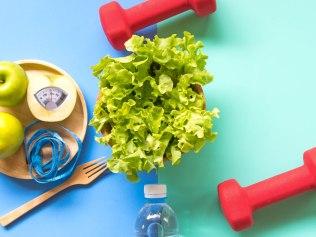How to fuel your body the right way
DIETITIAN sets the record straight on how to fuel our bodies for elite performance.

YOU wouldn’t fill up your car with vinegar and and expect it to run properly, so why fuel your body with junk if you expect it to do the same? Dietitian sets the record straight on the right fuel for our bodies.
ATHLETES have come a long way since their old school counterparts when it comes to fuelling their bodies for elite performance. A healthy eating plan is now a key part of any athlete’s training regimen.
Dietitian Kim Tikellis says while nutrition is a relatively young science, we’re learning more each day about the natural components in foods and the goodness that Mother Nature provides and the benefits of eating Australian-grown produce to fuel the active lifestyle.
“Take the natural plant phytochemicals in foods, like glucosinolates and phenolics in broccoli, that may help protect against cancer. We’re also learning more about holistic health and the interplay between food, mental and physical health,” she says.
As well as maintaining general good health, eating a balanced diet of all five food groups can make a big difference when it comes to performance, even to weekend warriors.
“I think most of us know how much better we feel inside and look outside when we focus on choosing and eating the right foods. The other way to think about this is that we also know that low carbohydrate or energy weight loss diets such as fasting can make you feel lethargic and cause mental confusion,” Kim says.
“I often say ‘would you pump sub-standard petrol into your car?’ Food is one of the essential elements of life and now we even know that what a pregnant mum eats can affect the long-term health of her baby. That’s amazing.
“We all want to get the best out of life, be less tired, have more energy, be switched on to do the things we enjoy. Good food does all these things for you and more. You only have to be ill for a few days to value the benefits of good health.”
She says eating Australian vegetables gives consumers peace of mind that you are consuming produce grown in quality soil and harvested by local farmers who know our climate and conditions best which means the best tasting vegetables, as well as the most nutrient-dense.
Foods have a positive effect on mental health too. According to Kim, recent research shows depression can be modified by following a Mediterranean healthy eating plan including two serves of fish per week with other healthy foods such as lean meat and poultry, a plentiful six servings of vegetables daily including legumes or beans, plus a daily serve of raw unsalted nuts.
Kim says it’s a huge concern that just four per cent of Aussies enjoy the recommended five serves a day of vegetables, which are good for your gut, heart, immunity and eyesight.
“Veggies are a vital part of a healthy eating plan as they naturally contain a diverse range of nutrients including fibre, plant phytonutrients, vitamin A, vitamin C, folate, potassium and magnesium, to name a few. People who do enjoy more veggies and fruit as part of a healthy and balanced diet will have a reduced risk of long term disease, such as coronary heart disease and some cancers. That’s worth investing in your veggies. They’re often the cheapest item per kilo on your supermarket bill too,” she says.
As fibre does not deteriorate easily, Kim says both fresh and frozen vegetables are an excellent way to boost your fibre intake in meals for gut health and satiety - and Australian-grown should always be your first preference. With today’s busy lifestyles, there’s no reason to feel guilty about opting for the more convenient frozen option - especially when there is Australian-grown produce readily accessible in the freezer aisle of the supermarket with brands like Birds Eye leading the charge.
“Thanks to modern processing techniques, frozen veggies are picked at peak ripeness, washed, blanched and ‘snap-frozen’ directly after harvest. Research shows that this seals in the precious vitamins, antioxidants and polyphenol nutrients we require for good health.
We do know that families who eat frozen veggies enjoy more vegetables overall. That’s good news when we know most Aussies don’t eat enough veggies. Frozen veggies also offer convenience of veggies out of season with no waste, use just what you need,” she says.
Although a lot has changed over time in terms of what we understand to be healthy food, Kim says one thing has always been, and always will be, the same.
“You are what you eat.”
Dietitian Kim Tikellis’s top three quick and easy nutritious recipes
All frozen veggies are ideal for cooking and perfect for fritters, savoury muffins, quiche, stews or warming winter soups. Frozen veggies no longer belong on the ‘emergency’ meal list. They add colour, flavour, plus nutrition to your favourite meal recipes and can be the easiest way to ensure you’re eating Australian-grown produce. Want to save on meal preparation time? Frozen veggies require no washing or chopping. Use directly from the freezer bag into your cooking pan. No mess, no waste, and better yet, no fuss!
- Minestrone soup: Add a can of four bean mix, a bag of frozen mixed vegetables such as the Birds Eye Australian Country Harvest range, and a jar of passata tomato sauce to a pot and bring to the boil. Let simmer before allowing to cool then serve.
- Snacks: Frozen vegetables, such as the Birds Eye Australian Field Fresh Corn or Peas or Sliced Green Beans, make great ingredients for savoury muffins and quiches.
- Veggie sauce: Puree single-cooked frozen vegetables, such as the Birds Eye Australian Field Fresh Baby Peas or Corn Kernels, add eastern spices for a chimichurri sauce for chicken or fish.
Originally published as How to fuel your body the right way


